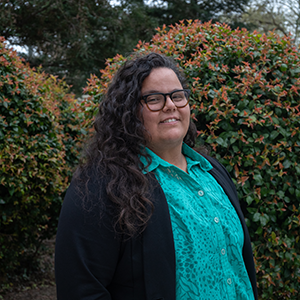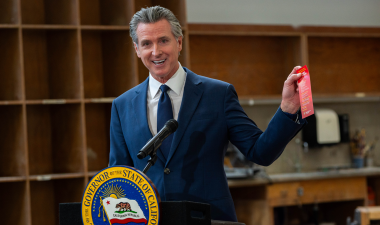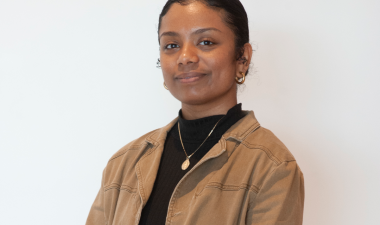
When told by an employer at a small business where she once worked that she’d never climb higher in her career without a college degree, Celina Bridges took the words to heart.
Eight years after she graduated from Turlock’s Freedom Education Center, a continuation high school, Bridges enrolled at Modesto Junior College.
“I’m proud to say I graduated from MJC,” said Bridges, who will graduate from Stanislaus State with a sociology degree this month. “I transferred with good grades, but becoming a student was really intimidating. MJC helped me return as a nontraditional student who’d been out of the game for eight years.
“What’s MLA?” she laughed about having to ask about the standard writing manual for college papers. “Now, I’m writing research papers.”
And the woman who graduated from high school at age 16, because she wanted to be done with school, hopes to remain in education.
Bridges expects to continue in her career as a care manager for a senior home-care service in Modesto, but she wants to earn a doctorate so she also can become a university professor.
“I want to give back to my community, supporting all marginalized groups, including the elderly,” Bridges said. “I want to be a professor, continue to stay in case management and teach on campus. This will allow me to stay relevant in the field and to apply current industry practices to academic settings.”
Her hope is to be accepted into a Ph.D. program in California.
“Our community needs better education and training to support our seniors and to create a world without ageism,” she said.
Shedding light on the needs of seniors is Bridges’ mission. She switched her major from art to sociology when she arrived at Stan State and discovered the Department of Sociology, Gerontology and Gender Studies.
“Ageism is one of the isms we don’t really understand, and when you work with elderly people, you realize how marginalized they are and how unsupported they can be, even if they are affluent,” Bridges said. “Older people are really vulnerable, and I think that’s what makes me want to serve this population.
“I have so many intersectional identity points of personality that I can relate to an older person. I’m big, brown and gay. I know what it’s like to be not seen and heard in a conversation. That’s what makes me really love working with older folks. I can relate to them because I, too, come from marginalized communities.”
She is biracial, she said, her mom is Mexican, and her dad is white. Her understanding of elders and end of life comes in part from her Mexican heritage.
“Day of the Dead is something we grew up celebrating. We’d take beer to my uncle’s grave site. My sister passed away a few years ago, and the way we grieve and perceive death, as well as how we embrace disabilities or challenges of normative standards, is deeply rooted in my family and community.”
Caring for elder family members is embedded in the culture of some immigrant families. However, as these families become more immersed in the quest of the American Dream and financial success, and as more generations are born, the ties to those traditional ways of caregiving may fall away, Bridges said.
Working in senior care, she has come to understand the value of older adults being able to live in their own homes until the end of life.
That came through in her McNair Scholars research project, “Agism and COVID-19: A War of Perception,” for which Bridges interviewed a dozen people aged 77 to 96.
“What was amazing and fascinating about my study was sitting with these women, 93- and 96-year-olds, who told me about their lives and how COVID impacted them,” Bridges said. “It was fascinating to hear and see people living independently at an age that 40 or 50 years ago many didn’t think that was possible.”
Not only are older adults living longer, but they are also active and remain engaged. During COVID, they learned how to use technology to attend church or connect with others virtually.
Bridges said there are vast misconceptions about the older population, and education is a means of addressing them.
Getting an education has been a joy for Bridges. As she prepares to graduate with her bachelor’s degree, she learned that she was nominated for an ASI Student Leadership award, an Outstanding Student award and that her artwork will be featured in an on-campus student showcase.
“I’ve had nothing but beautiful experiences at Stan State,” Bridges said. “I really grew as a scholar and as a professional. It’s been super nurturing. We have a good community here.”



